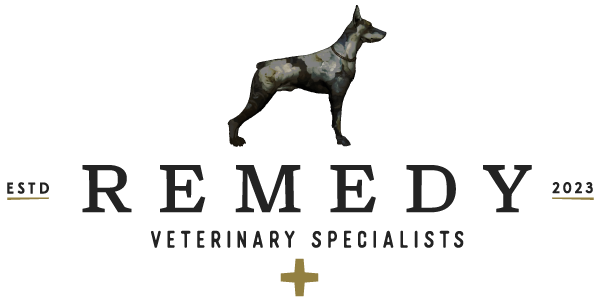Hepatic Encephalopathy
Introduction to Hepatic encephalopathy
When we digest food, particularly protein, the bacteria in our gut breaks down our food so that our body can use it as fuel. Some of the products the bacteria make need to be further processed by the liver before entering the body or they are toxic. When this doesn’t happen, dog’s can have a variety of symptoms like seizures, blindness and confusion. This means we often see these pet’s first on the neurology service.
This happens broadly for one of two reasons. The first is severe disease of the liver- this can be due to things like inflammation, toxins, infections or cancer. Diagnostics like ultrasounds, further lab work and biopsies are required to investigate this. Consultation with an internal medicine specialist is highly recommended to diagnose and address these diseases.
The second reason is that blood carrying these toxic products from the gut is somehow bypassing the liver due to abnormal blood vessels. This is called a portosystemic shunt (PSS). These shunts can either be outside the level (extrahepatic) or inside the liver (intrahepatic). The most effective treatment for these blood vessels to close them surgically or with a device called a coil. This procedure is performed by boarded veterinary surgeon or an interventional radiologist, and we recommend a follow up appointment with them to discuss.
Treatment
Treating the underlying disease is very important, which is why we recommend follow up with the specialists who address those diseases. However, we can help control the symptoms with the following medications.
Diet: Because protein is the primary source of the toxins, we need to limit the protein in the diet. Both prescription liver and kidney diets can be used for this purpose, as they are nutritionally balanced, but have restricted amounts of protein. You may have to try a couple of different diets before you find one that you pet likes. Once we settle on the diet your pet likes, it is very important that they only eat that food. Treats and chews should be avoided, as they may trigger your pet’s symptoms.
Antibiotics: The bacteria in the gut are what create the toxins that cause these symptoms. Therefore, we use antibiotics to decrease the amount of bacteria in your pet’s gut.
Lactulose: This is a laxative that helps move toxins out of the gut before they are absorbed. We want to adjust this medication until the dog is having 2-3 soft but formed stools a day. If you dog is having diarrhea, or is not having 2-3 soft stools a day, please contact us for instructions.
Antacids: Some dogs, particularly large dogs, also get gastric bleeding as part of this problem. We give antacids like Pepcid to help prevent this. You can obtain this medication at any human pharmacy.
Seizure Medications: Some dogs have seizures as a result of this problem. Additionally, if we suspect PSS we start seizure medications in advance of surgery to help decrease the chance of seizures after the surgery, which can be a very serious complication of that procedure.
Monitoring your pet
Please contact us if your pet develops new symptoms or if existing symptoms seem to be getting worse. Symptoms include:
Seizures
Change in personality
Difficulty staying awake
Difficulty sleeping
Difficulty walking
Dizziness
Circling
Blindness
Difficulty eating, drinking or swallowing
Contact Us:
Mon \ Fri: 8:30am - 5:30pm
Sat: by appointment only
Phone: (415)967-3303



